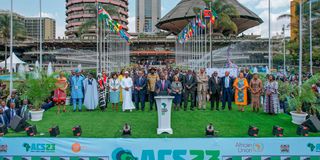Why Africa must do more to secure its development

President of Kenya William Ruto (C) surrounded by other African leaders delivers his closing speech during the closure of the Africa Climate Summit 2023 at the Kenyatta International Convention Centre in Nairobi on September 6, 2023.
What you need to know:
- The continent is home to approximately 1.3 billion people in 30 million-square kilometres of land.
- Conversation about Africa’s pathway to claiming its glorious place in the global order is hardly new.
- Africa is home to 18 per cent of the global population.
Blackwater founder Erik Prince recently called on the United States to “put the imperial hat back on” and govern countries and regions that are unable to govern themselves. In his radar is pretty much all of Africa. Simply put, Prince is calling for the recolonisation of Africa since, in his view, “they are incapable of governing themselves”.
Prince is a former US Navy Seal. Even though his prescription may be viewed as extreme, perhaps inconceivable in our time, his diagnosis of Africa’s plight is certainly not isolated. Africa’s lamentable situation within the global system is just as widely acknowledged as it is empirically borne out.
The continent is home to approximately 1.3 billion people in 30 million square kilometres of land. On account of both population and size, Africa ranks second, trailing only Asia. The continent is also appreciated for its immense natural resources, including the longest river and the second-largest rainforest on the planet.
It is also home to 30 per cent of the world’s vital minerals. World Bank estimates show that slightly over half of the 700 million people categorised as living in extreme poverty are in Sub-Saharan Africa. The continent’s share of the global Gross Domestic Product (GDP) is a paltry 3 per cent.
Africa is home to 18 per cent of the global population. To put it into perspective, Europe is home to 9 per cent of the global population, yet commands 20 per cent of the global GDP.
States, being the basic unit of the global system, are primarily defined by national interest. Reality about national interests is that they are mostly defined in isolation, with each state identifying what it seeks to achieve and sets about achieving it with the tools and instruments at its disposal.
Achieving national interest by one state may mean outright sabotage of the other. In fact, in numerous cases, it has occasioned exactly that. The level of influence; military, economic, political, diplomatic, determines how well a state succeeds in attaining its interest. It is a system that sparingly accords sympathy to fair play. Survival for the fittest is the rule of the game.
Conversation about Africa’s pathway to claiming its glorious place in the global order is hardly new. A lot has been said and documented on what Africa can do, indeed should do, to extricate itself from the position of attracting sympathy and pity to that of exerting control and influence. A number of systems and frameworks have been established as the anchor to the ‘liberation’ quest.
The African Union (AU) stands out as the continent’s best chance at enhancing and consolidating cohesion; politically, economically, and diplomatically. The African Continental Free Trade Area (AfCFTA), a part of the AU’s system, holds immense potential for the improvement of Africa’s economic fortunes.
Estimates show that its successful implementation would yield a combined GDP of $3.4 trillion, making it the fifth-largest economy in the world. It is truly the continent’s economic tour de force.
The challenge is hardly in the prescriptions. They are in plenty. The elephant in the room is the implementation and actualisation of the prescriptions.





